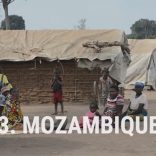Mozambique: UN recognises progress in education, equality, climate
Cancer kills more than 17,000 people annually in Mozambique

FILE - For illustration purposes only. [File photo: Lusa]
Mozambique records approximately 26,000 new cases of cancer annually, causing more than 17,000 deaths, health authorities announced today, calling for greater commitment to the prevention, diagnosis, and control of these diseases.
“In Mozambique, it is estimated that approximately 26,000 new cases and just over 17,000 deaths occur annually due to malignant disease, the most common being cervical, breast, and prostate cancers, Kaposi’s sarcoma, paediatric cancer, and other HIV/AIDS-related cancers,” said Ivan Manhiça, Permanent Secretary of the Ministry of Health (MISAU).
Speaking today in Maputo at the opening of the annual meeting of the National Cancer Control Programme, Manhiça noted that cancer is now the second leading cause of death in people aged 15 to 49, and the leading cause in individuals over 50.
“Ignorance of early signs and failure to regularly seek health services for cancer screening are among the causes of late diagnosis of the disease, resulting in loss of life,” stated the Permanent Secretary of the Ministry of Health (MISAU).
Mozambican authorities have stated that Kaposi’s sarcoma, prostate sarcoma, liver sarcoma, Hodgkin’s lymphoma, and oesophageal cancer are the most common causes of male death, while cervical and breast cancer are the most common causes of death for women.
Government figures indicate that paediatric cancers reach approximately 1,648 cases annually in the country, at a time when Mozambique reportedly has at least 1,700 health units equipped to conduct cancer screening.
While acknowledging progress in expanding the network of health units, the growing number of cancer professionals, and the adoption of new techniques for treating these diseases, the Mozambican government also acknowledged challenges related to cancer control and treatment.
“We are fully aware of the challenges. There are persistent inequalities in access to early diagnosis, gaps in treatment in certain regions, and an emotional and economic burden weighing on thousands of families. It is our responsibility to transform these weaknesses into opportunities for action,” said Ivan Manhiça.
READ: Mozambique: Radiotherapy services resume after 15 months
In light of these challenges, the Mozambican government has asked healthcare professionals to focus on disseminating information that encourages the prevention of these diseases and to advance the strengthening of the care network throughout the territory, ensuring care for all citizens.
“May we continue to invest in research and innovation. The future of the fight against cancer will increasingly be determined by scientific knowledge, technology, and the ability to transform discoveries into accessible solutions,” concluded Ivan Manhiça.












Leave a Reply
Be the First to Comment!
You must be logged in to post a comment.
You must be logged in to post a comment.